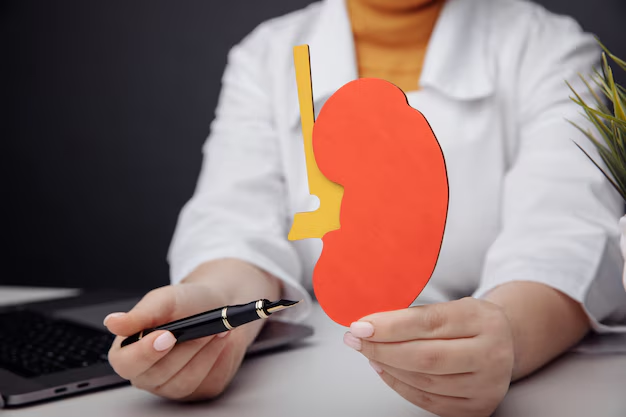Your Guide to Does Hypertension Cause Kidney Disease
What You Get:
Free Guide
Free, helpful information about HyperTension FAQ and related Does Hypertension Cause Kidney Disease topics.
Helpful Information
Get clear and easy-to-understand details about Does Hypertension Cause Kidney Disease topics and resources.
Personalized Offers
Answer a few optional questions to receive offers or information related to HyperTension FAQ. The survey is optional and not required to access your free guide.
Can Hypertension Lead to Kidney Disease? Here's What You Need to Know
Hypertension, commonly known as high blood pressure, is a prevalent condition affecting millions worldwide. Its impact goes beyond the cardiovascular system, raising the question: Can hypertension lead to kidney disease? The answer is yes—hypertension is a leading cause of chronic kidney disease (CKD), creating a vicious cycle where each condition exacerbates the other.
Understanding the Connection
High blood pressure damages the fragile filtration system of the kidneys over time. The kidneys' tiny blood vessels, known as glomeruli, play a critical role in filtering waste from the blood. When blood pressure is high, these vessels can become strained or damaged, reducing their filtering capacity and leading to CKD. This damage can remain undetected for years, progressing silently until kidney function is significantly impaired.
CKD is a serious condition that can progress to end-stage renal disease (ESRD), where dialysis or kidney transplantation becomes necessary. Therefore, managing hypertension is crucial not only for heart health but also for preventing kidney damage.
Symptoms to Watch For
While hypertension and kidney disease can be asymptomatic in the early stages, here are some warning signs to monitor:
- Persistent high blood pressure readings
- Swelling in the hands or feet
- Fatigue and general weakness
- Changes in urine output and color
- Sudden weight gain or loss
Taking Control of Your Health
Preventing and managing hypertension involves a combination of lifestyle changes and medication when necessary. Here are practical steps to safeguard your kidneys from hypertensive damage:
Healthy Diet: Adopt a balanced diet rich in fruits, vegetables, whole grains, and lean proteins. Limiting salt, red meat, and processed foods can significantly impact blood pressure levels.
Regular Exercise: Engage in physical activity for at least 150 minutes per week. Activities like walking, cycling, or swimming can help maintain a healthy weight and reduce blood pressure.
Medication Compliance: If prescribed, take blood pressure medications as directed. Consult with healthcare professionals to ensure the medications suit your lifestyle and adjust as needed.
Financial and Educational Resources
Managing hypertension and its effects on kidney health can be costly, but there are programs and resources available to help alleviate financial burdens and provide educational support.
- Medicaid and Medicare Benefits: Public health insurance programs might offer coverage for hypertension and CKD treatments.
- Supplemental Nutrition Assistance Program (SNAP): Access to healthy foods can be made affordable through assistance, helping you maintain a diet conducive to controlling high blood pressure.
- Patient Assistance Programs: Pharmaceutical companies often provide medications at reduced costs or for free.
- Local Health Clinics: These clinics can provide cost-effective healthcare services, including blood pressure monitoring and kidney function testing.
- Educational Workshops: Community centers might offer free workshops on managing chronic health conditions effectively.
Here’s a handy list of support options:
- 🏥 Medicaid and Medicare: Health coverage for eligible individuals
- 🥦 SNAP: Assistance for purchasing healthy foods
- 💊 Patient Assistance Programs: Reduced-cost or free medications
- 🏠 Local Health Clinics: Accessible healthcare services
- 📚 Educational Workshops: Free chronic condition management sessions
Addressing hypertension not only protects your heart but also shields your kidneys from potential harm. Being proactive in healthcare management can truly make a difference in quality of life, as well as prevent severe complications down the line.
What You Get:
Free HyperTension FAQ Guide
Free, helpful information about Does Hypertension Cause Kidney Disease and related resources.

Helpful Information
Get clear, easy-to-understand details about Does Hypertension Cause Kidney Disease topics.

Optional Personalized Offers
Answer a few optional questions to see offers or information related to HyperTension FAQ. Participation is not required to get your free guide.


Discover More
- a 66 Year Old Female With a History Of Hypertension
- Are Eggs Bad For Hypertension
- Are Eggs Good For Hypertension
- Are Endocrine Disorders Causing Hypertension Rare
- Can Adderall Cause Hypertension
- Can Alcohol Cause Hypertension
- Can Allergies Cause Hypertension
- Can Anemci People Get Hypertension
- Can Anemia Cause Hypertension
- Can Antibiotics Cause Hypertension
